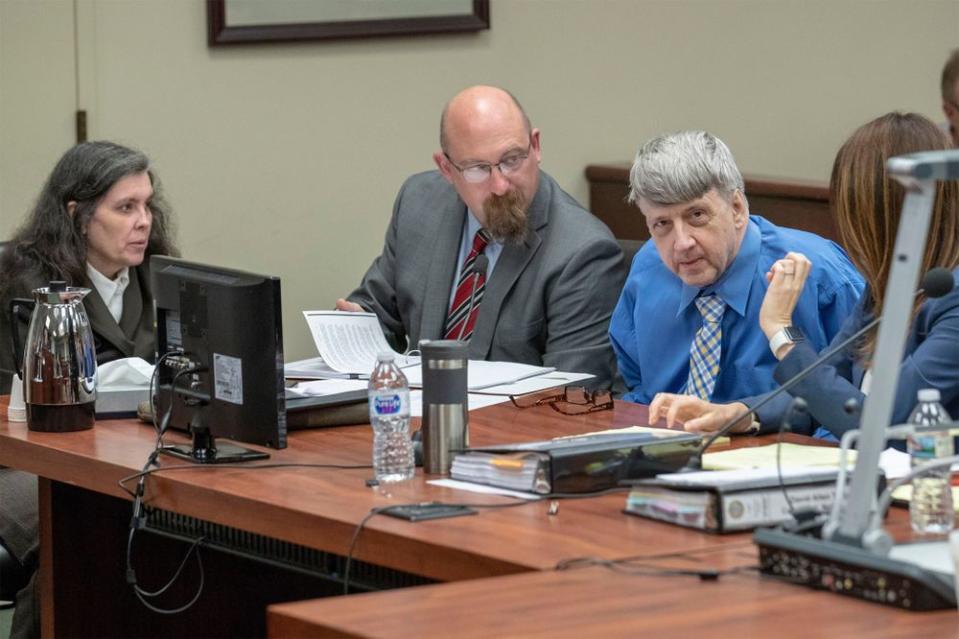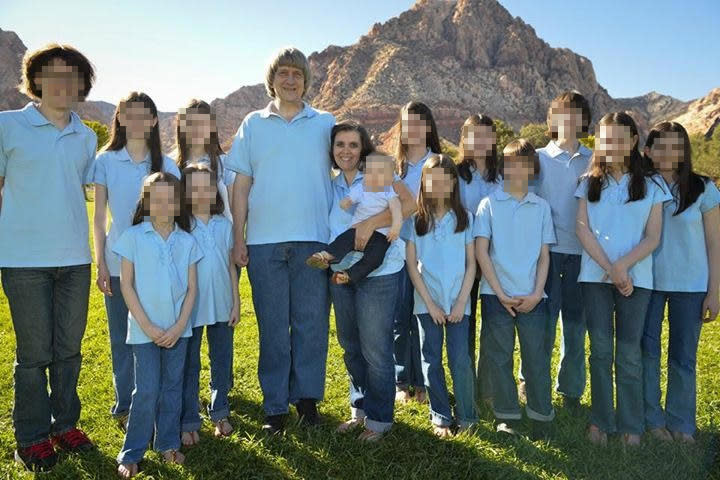House of Horrors: 7 Harrowing Revelations as Investigators Describe Alleged Abuse
California investigators on Wednesday provided — for the first time in months — new information about their investigation into the alleged abuse, imprisonment and torture of the Turpin children, which was discovered earlier this year.
Prosecutors have argued all 13 kids were abused and most of them were held captive and tortured in their suburban Perris home. The children ranged in age from 2 to 29 when their parents, David and Louise Turpin, were arrested in January.
At the conclusion of the preliminary hearing, which carried over to Thursday, a judge found only the youngest child, the toddler, was spared abuse.
The alleged violence in the family was first reported by the family’s 17-year-old daughter, who escaped out her bedroom window early on Jan. 14 before calling 911 with a smuggled cell phone.
“We live in filth,” she told the operator, according to audio of the call played in court at a preliminary hearing on Wednesday for David and Louise, who have pleaded not guilty to all of their charges.
Here are seven revelations about the case from the preliminary hearing.
• Want to keep up with the latest crime coverage? Click here to get breaking crime news, ongoing trial coverage and details of intriguing unsolved cases in the True Crime Newsletter.


1. Daughter Called 911 Because ‘She Couldn’t Stay and Watch Her Two Sisters Chained Up’
The teenage Turpin girl, whose 911 call led to her parents’ arrest, had been planning to escape for two years, Riverside County Sheriff’s Deputy Manuel Campos testified on Wednesday.
At last, the teen was able to get an old cell phone that had belonged to her older brother, Campos said.
Shortly before 6 a.m. on Jan. 14, not far away from the family’s home, the girl dialed 911. “They are abusive,” she said of her parents, according to the call audio. “And two of my sisters are chained up.”
The teen said that her family had previously lived in Texas, where her parents “acted differently” — an echo of what authorities have described as an escalating cycle of abuse in the home.
“They left us there for four years [in Texas] and then later they came back and picked us up,” the girl told 911 of her parents. “But they are living with us right now.”
Behind closed doors — according to the girl’s statements as well as law enforcement interviews with other siblings, recounted in court testimony — the Turpin children were allegedly subject to regular physical abuse, including being hit, choked and thrown across the room by their mother.
“She [the teen] said she couldn’t stay and watch her two sisters chained up and crying. It was hurting her and depressing her and she couldn’t watch it anymore,” Campos, the deputy, said in court.
As part of her plan, the girl asked her sisters if she could take photos of them in chains “so she could have proof when she called for help,” Campos said.
2. Teen’s Bedroom Was So Dirty ‘She Couldn’t Breathe’
The 17-year-old daughter told authorities she was not allowed to leave her room, which she shared with three of her sisters, without permission — and even then was only allowed out to eat, use the restroom and to brush her teeth, according to Campos’ testimony on Wednesday.
“She told me that she lived in filth. Her room was dirty and smelled really bad,” he testified.
“Because it smelled so bad, there were often times she couldn’t breathe,” he said. “She would stick her head out of her bedroom window” — a violation of rules against moving the blinds that covered the room’s windows.
Meanwhile two of the sisters who shared her room allegedly had been kept in chains for taking candy from the kitchen, Campos said. According to the 17-year-old, they were chained up for a month or two, freed only to relieve themselves, eat and brush their teeth.

3. Teen Spent 20 Hours a Day and Her Room — and Slept 15 Hours
The teenage daughter spent “about 20 hours a day” in her room, Campos said. She slept for 15 hours or more and would play with her Barbie dolls and write songs and stories, he said.
Four older siblings, all of whom were at least 20 years old, were allowed to leave their rooms and spend time together in the house, according to Campos. But none of the siblings could leave the home without permission from their mom and dad.
Inside their rooms, the children “were supposed to be sitting down” and were not allowed to exercise, Campos said.
When their parents were gone, however, the kids would “come out [of their rooms] and hang out,” he said.
4. Kids Ate One Meal a Day ‘Because of Their Schedule’
Authorities have said that when the Turpin children were found in January, they seemed “malnourished and very dirty.” The oldest daughter, who was 29 years old, weighed 82 lbs., according to Riverside County District Attorney Mike Hestrin.
In court on Wednesday, Campos said that the 17-year-old said the siblings did not eat breakfast and that, eventually, they were served one meal a day “because of their schedule.”
“They weren’t awake long enough to separate the meals” between lunch and dinner, the girl explained, according to Campos.
The girl said they ate “either a peanut butter sandwich or a bologna sandwich [or] frozen burrito or chips,” Campos testified.
He said that she told him she had been “constantly” eating peanut butter sandwiches for several years — so long that she could no longer stand them without gagging or throwing up. Instead she ate only burritos, he said.

Meals were prepared by the oldest daughter, who was 29, sheriff’s investigator Thomas Salisbury testified. Once the food was ready, the oldest daughter would tell Louise and the other kids “would come out one at a time and eat and then return to the bedroom.”
Hestrin, the prosecutor, told reporters in January that the Turpin family appeared to adhere to a bizarre schedule of sleeping all day and being awake at night. According to Campos’ testimony, the teenage Turpin daughter said she would wake up at 11 p.m. and go to sleep again around 3 a.m.
She said she slept so much because “that was part of their schedule.”
According to Campos’ testimony, the 17-year-old said that, at her mother’s decision, her father “was on a day shift and whatever his schedule was they would make it their sleeping schedule.”
5. Mom ‘Doesn’t Like Us’ and Called One Daughter the ‘Devil,’ Teen Said
Speaking to the 911 operator after escaping her family’s home, the 17-year-old was asked who in the family took care of her.
“I don’t know much about my mother. She doesn’t like us. She doesn’t spend time with us, ever,” the girl said, according to the call audio. “I take care of myself and mother finds food for us, but we never talk.”
Instead, both the 17-year-old and other siblings described their mom as a volatile and violent figure — a picture of her that David’s defense attorney seemed to seize on during Wednesday’s hearing, implying she was the driving force in the alleged abuse.

One of the oldest Turpin siblings, a 22-year-old boy, told investigators that David had chained him up, investigator Salisbury testified.
The 17-year-old daughter told authorities that Louise referred to her and one of her sisters as the “devil,” according to Campos, the sheriff’s deputy.
“When she heard her mother call them the devil, it really bothered her and hurt her a lot,” Campos said.
6. 22-Year-Old Was Chained Up Off and On for Years, He Said
One of the oldest Turpin siblings, a 22-year-old son, told authorities that he had been either restrained or chained up “off and on for six and a half years,” Salisbury testified.
The son said he and two of his sisters were chained up because they were “suspects,” Salisbury said — as in, suspected of being disrespectful and “stealing” things around the house, including food.
At first, the son said, he had been restrained with ropes but his parents had to switch to chains because he learned to free himself with his teeth, according to Salisbury.
David allegedly chained his son up the first time and his mother chained him up a second and third time after that, Salisbury said. The son was in chains when authorities came to the Turpin house on Jan. 14 and had been that way for “a couple of weeks.”
“He said it was extremely hard being chained because they were attached to parts of his upper bunk bed and it was hard for him to sleep and hard for him to move, role over or scratch his back,” Salisbury said.
7. Siblings Had Stunted Growth, ‘Low Cognition’
The alleged abuse and malnutrition endured by the siblings at the hands resulted in stunted growth and “low cognition” for some, investigators testified on Wednesday.
Investigators with the Riverside County District Attorney’s Office who spoke with doctors treating the siblings at area hospitals painted a disturbing portrait of the debilitating long-term effects of the alleged abuse.
One of the adult female children was 35 lbs. underweight and suffered from “severe protein caloric malnutrition, numbness and weakness in extremities,” as well as “severe skeletal abnormalities,” investigator Wade Walsvick testified, based on his conversation with a doctor in the Corona Regional Medical Center who treated all seven adult siblings.
Like other siblings, the adult woman suffered from “low cognition and cachexia, a muscle-wasting syndrome,” Walsvick said. The woman also had “severe skeletal abnormalities.”
According to testimony by prosecutor investigator Patrick Morris, who spoke with doctors with the Riverside Health System treating the younger Turpin siblings, one pre-teen girl was also severely underweight and suffered from low cognition and cachexia.
Morris said on the stand that she was so skinny, her mid-upper arm “was equivalent to a 4½-month-old.” He added that the girl had liver damage due to malnutrition and had “social dwarfism — a stunted growth damage due to malnutrition.”
